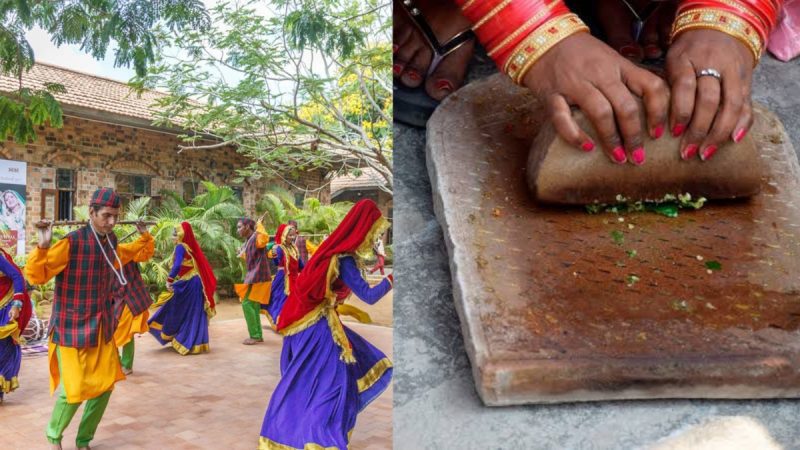Diwali, the Festival of Lights, is celebrated across India with diverse customs that reflect the rich cultural tapestry of each region. In the heart of the Himalayas, the Garhwali region in Uttarakhand brings a unique charm to the festival, blending ancient traditions with a reverence for the sacred landscape. Known as the “Land of Gods,” Garhwal holds a special place in the hearts of those who celebrate Diwali in a manner distinct from the more well-known festivities across India. Garhwali Diwali is not merely a celebration of light over darkness but also a homage to the Earth and ancestral customs kept alive through storytelling, food, and rituals that resonate with the mountain spirit.
The Festival Of Lights In The Land Of Gods
Chef Vijay Thapliyal, Executive Chef at The Lodhi, New Delhi, brings the flavours and memories of Garhwali Diwali alive through his culinary creations, many of which are inspired by his hometown of Mason in Pauri Garhwal. “My Diwali memories are filled with the aroma of traditional recipes cooking over a chulha and the warmth of family gathered together,” says Chef Thapliyal. He recalls the earthy, soulful essence of the festival as celebrated in his ancestral home.
Diwali in Garhwal is marked by a variety of unique traditions, many of which involve fire in both practical and symbolic forms. One of the most captivating customs is the Akhara or fire dance. In this spirited dance, performers hold torches or flaming sticks, moving rhythmically to the beats of traditional Garhwali music. “The fire dance, or Behla, brings the community together, its flames representing purification and the warding off of evil spirits. It’s a spectacle of skill and unity,” says Chef Thapliyal.
During the Diwali season, his family would perform rituals to honour the household gods and ancestral spirits. Houses are adorned with earthen lamps to light the way for these spirits, a homage as well to the mountain gods and the spirits of the land.
Culinary Delights Of Garhwali Diwali
Food is central to the Garhwali Diwali celebrations. “In Garhwal, Diwali is incomplete without Roat, a traditional sweet flatbread made from wheat flour, jaggery, and ghee, often flavoured with fennel seeds and cardamom. No rural puja is complete without this,” he shares.
Another festive dish is Jhangore Ki Kheer, a creamy pudding made from barnyard millet, milk, and sugar, enriched with cardamom and garnished with nuts. This dessert is both simple and deeply satisfying, embodying the warmth of Garhwali hospitality. Among the other delicacies are Gulgule, small, bite-sized sweet fritters made from wheat flour, jaggery, and fennel seeds. “Gulgule is a snack that reminds me of childhood, of family and friends sitting together with bowls of these treats, sharing stories and laughter,” Chef Thapliyal recounts.
One of the most nostalgic memories Chef Thapliyal holds is of the chulha, a traditional mud stove used in his family home. “My mother still cooks on traditional mud stoves, imparting a unique smoky flavour to the dishes,” he says.
Some of these cherished dishes include Chainsoo, made from roasted black gram (urad dal) and cooked with aromatic spices for a nutty, protein-packed dish. Another staple is Kandali Ka Saag, a nutrient-dense dish made from the tender leaves of the stinging nettle plant, found growing naturally in Himalayan water bodies. “Even if we didn’t like it as kids, it was mandatory for us to eat this for immunity and blood circulation,” he recalls.
Chef Thapliyal’s family would also prepare Pisyu Loon, a traditional Garhwali condiment made with fresh coriander, garlic, green chillies, cloves, and coarse sea salt, ground on a silvatta (grinding stone). “My mother’s Pisyu Loon added a burst of flavour to our meals, embodying the rich culinary heritage of my region,” he says.
A Celebration Of Heritage
For Chef Thapliyal, Garhwali Diwali is not just a festival; it’s an annual opportunity to reconnect with his roots, revive the flavours, and celebrate the customs of his heritage. “Diwali has always been a time to cherish our roots and celebrate with family. Every meal we share during this festive season carries the love and warmth of home,” he says. “Food is not just nourishment; it’s a way to connect with our heritage and each other.”
As the lights of Diwali illuminate homes and hearts, Garhwali traditions certainly bring a sense of timelessness to the festival.
Cover Image Courtesy: Press Release

